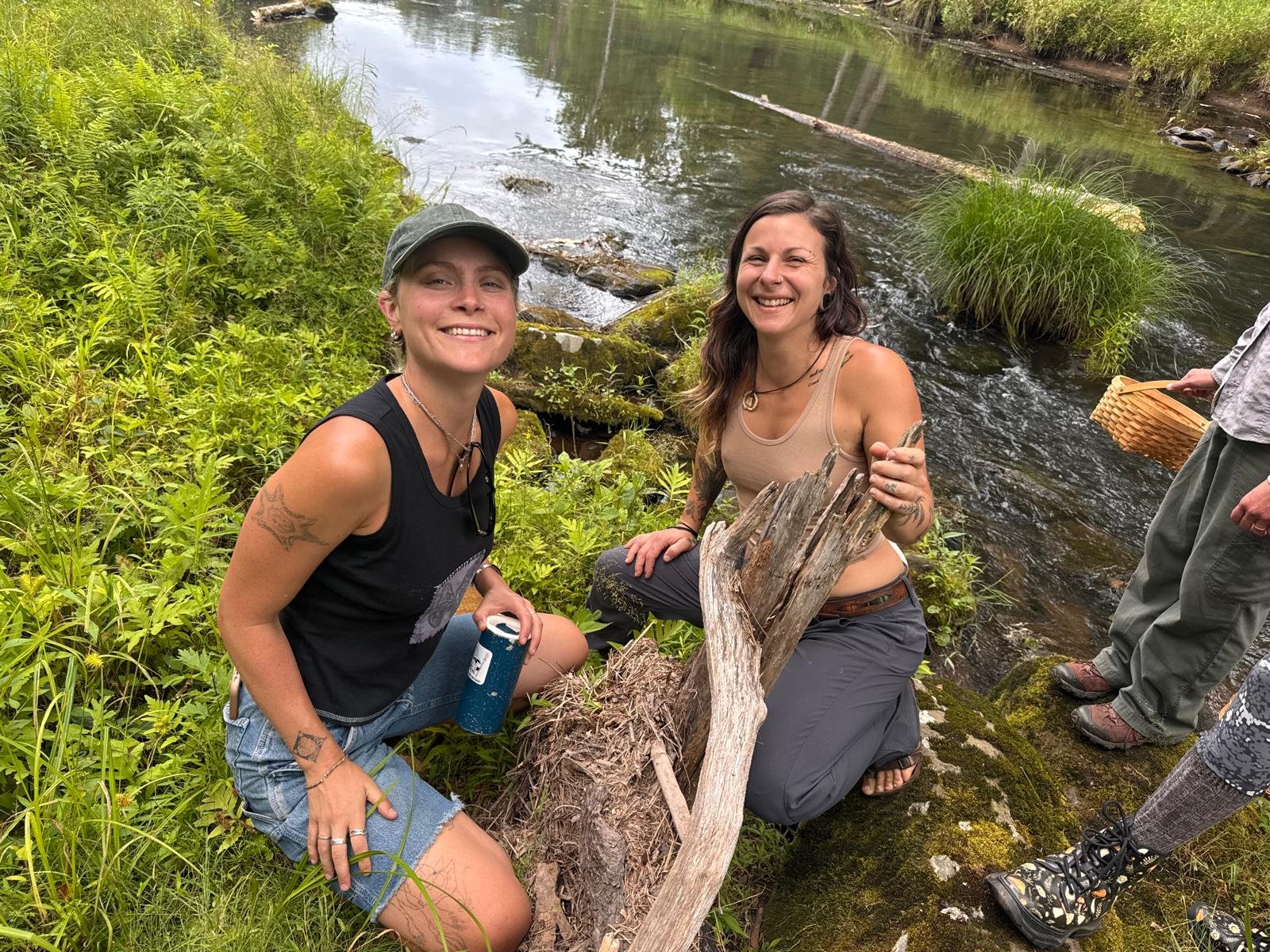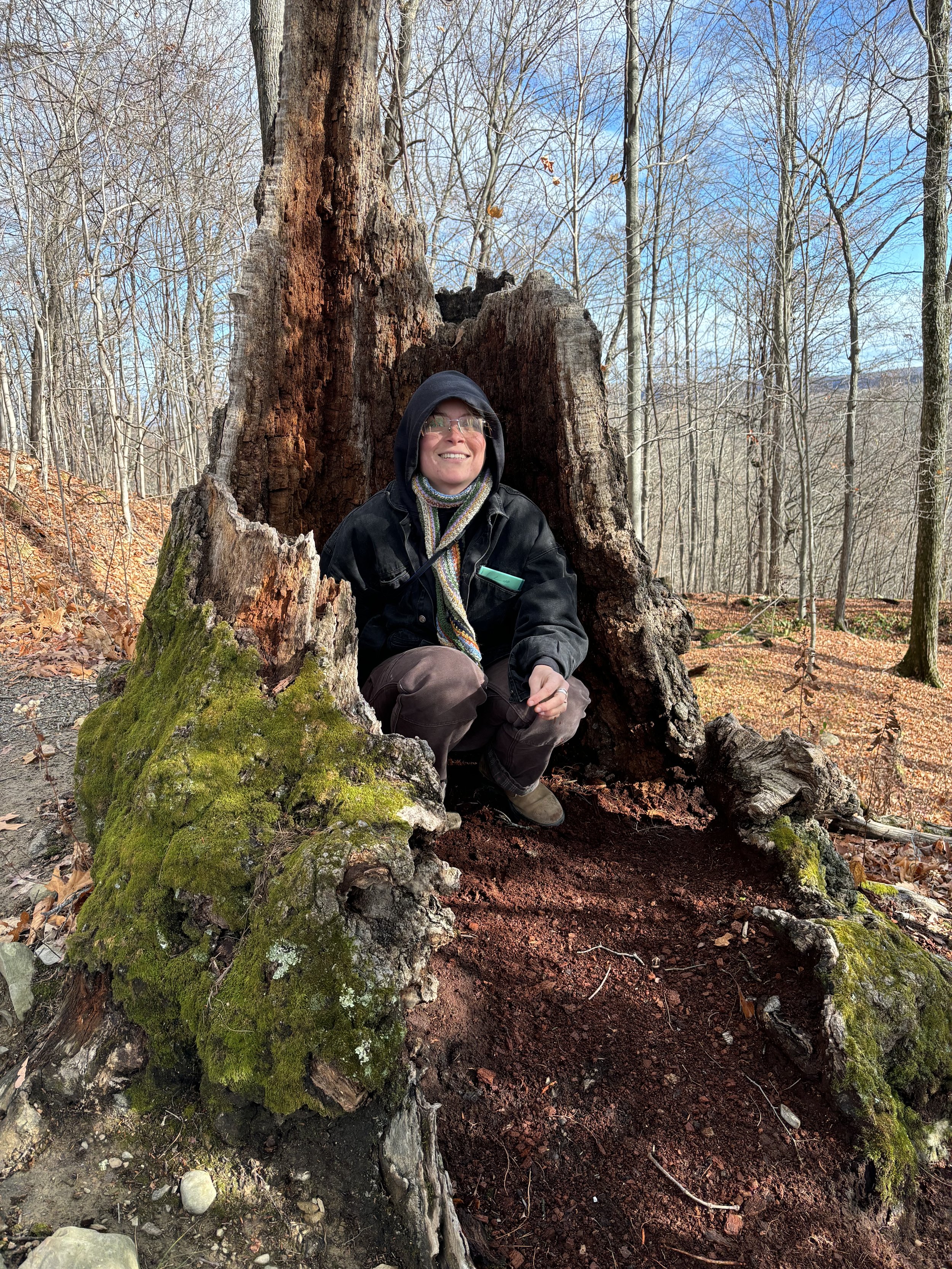About
We are Alyssa and H.e, two herbalists and friends, who are excited to explore the power of our natural world with you.
H.e and Alyssa met in September 2023, when h.e had joined the second year cohort of Arbor Vitae School of Traditional Herbalism. H.e was living locally, and Alyssa traveled from Maine each month. They spent the year in school together, diving into clinic work, digging deeper into Chinese Medicine, spending days botanizing outdoors with our incredible teachers, and honing our skills as practicing herbalists. We enjoyed our days outdoors so much and were often spotted deeply sniffing roots and leaves, and exploring what the forest floor and riverbeds had to offer.
Fast forward to March 2024, h.e was planning their summer escape to Europe and was looking for a temporary replacement for their job as the manager of a Chinese Medicine apothecary. Meanwhile, Alyssa began planning her escape from Maine to relocate to the Hudson Valley, and so began this next fruitful chapter of both their lives.
Alyssa worked solo for the clinic all summer, and when h.e returned, they began working together - medicine-making and dreaming up this course. They continued their final year of schooling together and graduated from herb school in May 2025! Alyssa and h.e are friends, colleagues and now business partners. Connected by their shared love of plants and the natural world.
In June 2025, h.e and Alyssa launched Common Abundance together, and had an incredible first year of co-facilitating together.
We can’t wait to have you join us on the next step in our journey!
Us at Arbor Vitae Graduation together :)
Meet Alyssa & H.e
-
Meet Alyssa Pittera!
Alyssa is a recent transplant to the Hudson Valley from Maine and currently lives in Rosendale, NY. Where our course will be based!
She is a lifelong lover of plants, mushrooms, and the natural world all across the country and then some. Her love of plants began long before she knew their names, but became a focal point in her life in 2015 when she did a 3 month Permaculture internship on a farm in Hawaii. She loved learning about composting and soil health, seed starting, harvesting veggies, and tending to a medicinal herb garden.
In 2016,she began attending as many classes and workshops at the California School of Herbal Studies as she possibly could. She learned how to grow, wildcraft, and identify plants and wild weeds of the region and how to craft them into potent botanical medicines. At the time, she was struggling with cystic acne after getting off birth control and found that the remedies she was making at the Herb School were helping to alleviate her acne so much more than anything had before.
So in 2017 in Washington State Alyssa started The Salty Rose, with just 5 products. The Salty Rose is now her main source of joy and income with over 50 products ranging from herbal oils, creams, salves, scrubs, to dozens of herbal and mushroom tinctures and elixirs.
In 2021 she decided to continue her education at the Arborvitae School of Traditional Herbalism training to be a clinical herbalist, and currently works as an assistant Witch to h.e at Bloom & Reveal Botanicals. She will be graduating in May!
Alyssa has been teaching a variety of classes on medicine making and leading plant & mushroom walks for the past 5 years. She is a garden loving, travelling, artist, dog momming, aggressive plant & mushroom enthusiast that can't wait to gather amongst the Common Abundance of the Hudson Valley with you.
-
H.e has been a lifelong reverer of nature, having mused upon it through their studies, art and free time all their life.
They have a B.S. in Conservation & Resource Studies, with a concentration in socioecology from UC Berkeley, and studied herbalism both through college ethnobotany coursework, Rosemary Gladstar’s correspondence course, the Foundations of Bioregional Herbalism program at the Northern Appalachia School, Arbor Vitae School of Traditional Herbalism’s 3-Year Clinical Program, and most importantly, community herbalists.
They spent years as a garden/outdoor educator, vegetable farmer, and beekeeper, prior to settling wholeheartedly into the study of herbs.
They managed the herbal apothecary at Bloom + Reveal Botanicals from January 2023 through December 2025, and graduated from the 3-year Clinical Herbalism Program at Arbor Vitae School of Traditional Herbalism in May 2025.
H.e is a NADA-certified acudetox specialist, crochet enthusiast, avid reader, and music lover.
This year, they are apprenticing with the renowned clinical herbalist, 7Song- founder of the Northeast School of Botanical Medicine and on-site herbalist at the Ithaca Free Clinic.
Meet the Land
We are grateful to live on and steward land in what is now referred to as Kingston and Rosendale, New York.
This land is unceded territory of the Munsee Lenape people, sometimes referred to as the Esopus band in this area.
Displaced through violent war, land theft, and colonialization as early as the 17th century, descendants of the Munsee Lenape diaspora continue to live and resist today — largely in places they were forced to migrate like Oklahoma, Wisconsin, and Ontario.
We offer gratitude to these original caretakers and acknowledge the deep, reciprocal relationship they held with this land. As students and practitioners of herbal medicine, we commit to learning from their example: tending the earth with humility, reciprocity, and respect.
It is absolutely our responsibility to be mindful of these truths, and move with graciousness as we honor the harm done here, where we look for healing.
May this course be one small act of reweaving — of remembering the original stewards of this place and renewing our own responsibilities to the land and to each other.
We want to lift this up, and acknowledge that many of the plant relationships we have today are due to the thoughtful stewardship of these native peoples for thousands of years.
We believe that by continuing to steward the land in a mindful and caring way, we can only hope to do some ounce of justice to this land rife with a history of genocide, extraction, colonialism, and pollution.
Why Common Abundance?
Historically, humans have relied on communalism to grow crops, graze animals, and forage the land for all the treasures it has to offer. The commons have been the site of shared arts, political discourse, pleasure, and connection. In a culture dominated by individualism, it can be hard to remember what the commons have to offer us and that they are still all around us. Stepping into nature, coming into relationship with it, and relying on it help us reopens our eyes to the abundance all around.
The name ‘Common Abundance’ reminds us not only that nature is teeming with treasures so common we forget that they can heal and feed us, but also that we can discard the capitalist notion that we do not benefit, as a society, from shared common resources. We are abundant when we are together!
Why Bioregional Herbalism?
Bioregional Herbalism is a practice that focuses predominantly on the local flora and fungi of one’s particular region. For us, that is the rich and diverse Hudson Valley of Upstate New York. The Hudson Valley is teeming with resilient medicinal plants and mushrooms, many of them often viewed as “invasive.” We like to call them highly adaptable.
When we commune with our local allies, they are directly teaching our cells how to survive and thrive in this specific environment we share with them. We are breathing the same air, treading the same soil, and essentially drinking the same water. Because we are not separate from nature. We ARE nature, and these practices are how we can come back to this on a cellular level.
Our bodies recognize plants. Herbalism is not pharmaceutical. Plants do not force feed our bodies isolated constituents to achieve a desired result, they gently nourish, shift, and invite subtle changes that initiate healing on levels far beyond the physical. Some plants are gentle, and some are bossy, and trust, they will show you!





